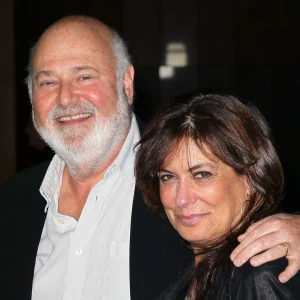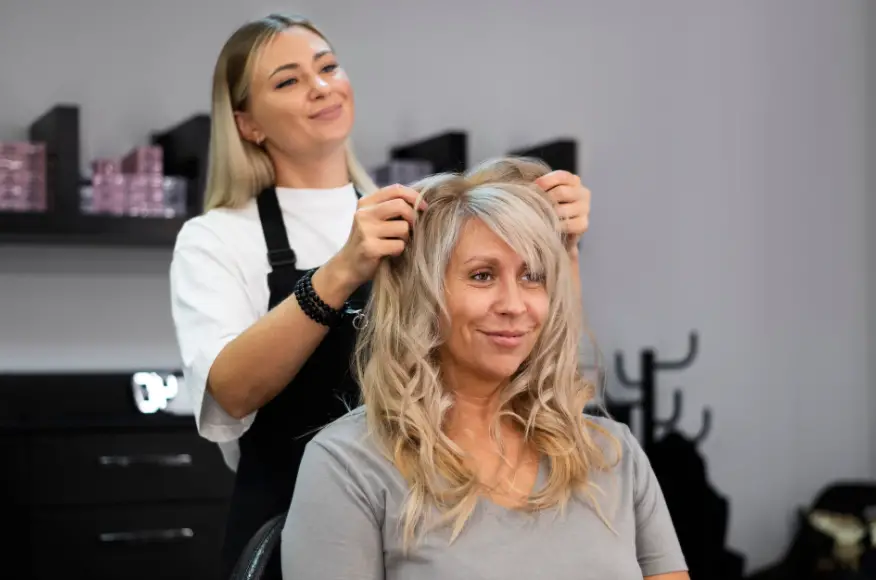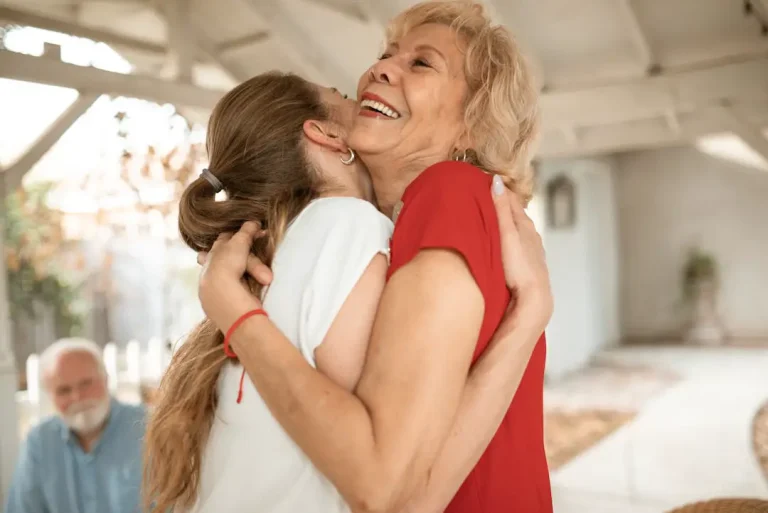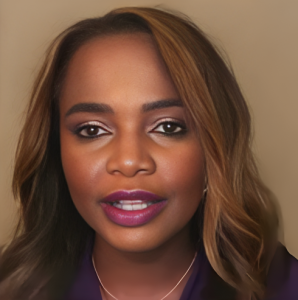Woman With Only $12 Walks Into Hair Salon – What Happens Next Will Restore Your Faith in Humanity
Sometimes the smallest acts of kindness create the biggest waves of change. When salon owner Maria Santos encountered a desperate mother on the morning of her son’s wedding, she had no idea that one simple decision would transform not only that woman’s life, but thousands of others around the world.
A Desperate Mother’s Morning Crisis
The morning sun had barely begun to filter through the windows of Bella Vista Hair Salon when Maria Santos heard the gentle chime of her front door. It was only 7:30 AM, thirty minutes before her official opening time, but Maria had arrived early to prepare for what she expected to be a busy Saturday filled with wedding parties and special occasion appointments.
What she saw when she looked up from organizing her styling tools made her heart immediately ache with empathy. Standing in her doorway was a woman who appeared to be in her early sixties, with silver hair that hadn’t seen professional care in months and eyes that were red and swollen from what had clearly been a night of tears.
The woman clutched a worn leather purse against her chest as if it contained her most precious possessions, and her entire demeanor spoke of someone who was fighting to maintain dignity in the face of overwhelming circumstances. Her clothes were clean but clearly showing their age, and her shoes had been resoled multiple times, telling the story of someone who made every dollar stretch as far as possible.
Maria could see the trembling in the woman’s hands as she approached the reception desk, and when she finally spoke, her voice was barely above a whisper. “Excuse me,” she said, her accent revealing her as someone who had immigrated to this country decades ago but had never lost the careful pronunciation of someone speaking in their second language.
“My son is getting married today, and I… I only have twelve dollars,” she continued, her voice breaking slightly on the words. “I know it’s not enough for a real appointment, but I was hoping maybe you could just… help me look a little better for his wedding.”
The raw honesty and quiet desperation in the woman’s request hit Maria like a physical blow. Here was a mother facing one of the most important days in her son’s life, and she was asking for help with the kind of humility that spoke of someone who had learned to expect very little from the world.
A Life Shaped by Hardship and Love
As Maria gently guided the woman, who introduced herself as Elena Vasquez, to a comfortable chair, the story of a life filled with sacrifice and unwavering maternal love began to unfold. Elena had immigrated to the United States forty years earlier with her husband Carlos and their young son Miguel, carrying nothing but hope for a better future and the determination to build a life through hard work.
For decades, Elena and Carlos had worked multiple jobs to support their family and put Miguel through school. Elena cleaned office buildings at night and worked in a laundry during the day, while Carlos labored in construction and drove a taxi on weekends. Every penny they earned went toward their son’s education and their modest home, leaving little for luxuries like professional beauty treatments.
Carlos had been Elena’s anchor throughout their challenging journey, the one person who never failed to tell her she was beautiful even when she felt worn down by the relentless demands of their difficult life. His unexpected death from a heart attack two years earlier had left Elena not only grieving but also struggling financially on her fixed social security income.
Miguel, now a successful engineer, had tried repeatedly to help his mother financially, but Elena’s fierce independence and pride made her reluctant to accept what she saw as charity, even from her own son. She had raised him to be self-sufficient, and she was determined to maintain her own independence as long as possible.
The wedding represented not just Miguel’s happiness but also the culmination of all Elena’s sacrifices and dreams. She wanted desperately to look her best for this momentous occasion, to stand proudly beside her son as he began his new life, but her limited resources had left her feeling hopeless about her appearance.
As Elena shared pieces of her story while Maria began gently washing her hair, it became clear that this wasn’t just about looking good for a wedding – it was about a mother’s deep need to feel worthy of standing beside the son she had raised with such love and sacrifice.
The Power of Professional Compassion
Maria Santos had built her salon business over fifteen years through a combination of skill, hard work, and genuine care for her clients. As the daughter of immigrant parents herself, she understood the struggles that families like Elena’s faced, and she had never forgotten the kindness of strangers who had helped her family during their own difficult times.
Looking at Elena’s reflection in the salon mirror, Maria saw not just someone who needed a haircut, but a woman whose entire sense of self-worth had been worn down by years of hardship and recent grief. This was an opportunity to give someone more than just a beauty treatment – it was a chance to restore dignity and confidence when they were needed most.
“Today, you’re going to feel like a queen,” Maria told Elena with gentle firmness, beginning the transformation with a precision and care typically reserved for her most expensive appointments. She took her time with Elena’s silver hair, cutting away the damaged ends and shaping it into a style that would be both elegant and easy for Elena to maintain at home.
As she worked, Maria listened to Elena’s stories about Carlos and Miguel, understanding that the conversation was as therapeutic as the beauty treatment itself. Elena spoke of her late husband’s habit of bringing her wildflowers he found during his construction work, and how Miguel had graduated valedictorian of his engineering class despite working part-time jobs throughout college.
The hair styling was followed by a gentle facial and makeup application, with Maria teaching Elena simple techniques she could use at home to maintain her appearance. Every step of the process was conducted with the kind of attention and respect that Elena hadn’t experienced in years, making her feel valued and cared for in ways that went far beyond the physical transformation.
When Maria finally turned Elena toward the full-length mirror for the reveal, the transformation was remarkable not just in terms of appearance but in the immediate change in Elena’s posture and expression. The woman who had entered the salon stooped with worry and shame was now standing straight, her eyes bright with tears of joy rather than desperation.
A Moment of Recognition and Renewal
The reflection that greeted Elena in Maria’s salon mirror was a revelation that transcended mere physical appearance. For the first time in the two years since Carlos’s death, Elena saw herself as something other than a grieving widow struggling to make ends meet. She saw the woman her husband had fallen in love with, the mother who had raised a successful son, the immigrant who had built a life through determination and sacrifice.
“I look like myself again,” Elena whispered, her voice filled with wonder as she gently touched her styled hair and looked at her reflection from different angles. The makeup had been applied with such skill that it enhanced her natural features without making her look artificial, and the haircut had taken years off her appearance while maintaining the dignity appropriate for a woman of her age.
Maria watched Elena’s transformation with professional satisfaction but also with deep emotional fulfillment. This was why she had entered the beauty industry – not just to make people look better, but to help them feel better about themselves and face the world with renewed confidence.
When Elena reached into her worn purse to extract the twelve crumpled dollar bills she had brought as payment, Maria gently closed Elena’s hands around the money and shook her head. “Today, this is my gift to you and to Miguel,” she said simply. “Every mother deserves to feel beautiful on her son’s wedding day.”
The tears that filled Elena’s eyes were no longer tears of desperation but tears of gratitude and overwhelming emotion. She hugged Maria with the fierce affection of someone who had just been given an unexpected gift of immeasurable value, whispering thank you in both English and Spanish as she struggled to express the depth of her appreciation.
As Elena left the salon, her posture was completely transformed. She walked with confidence and pride, ready to attend Miguel’s wedding not as a burden or an object of pity, but as a mother who could stand tall beside her son on one of the most important days of his life.
Gratitude Beyond Words
The next morning, Maria arrived at her salon to find it filled with the most beautiful arrangement of flowers she had ever seen. The delivery included roses, lilies, orchids, and other exotic blooms that must have cost several hundred dollars, far more than Elena’s modest budget should have allowed.
The accompanying card, written in Elena’s careful handwriting, simply read: “Thank you for giving me back my dignity and helping me stand tall beside my son. You are an angel. – Elena Vasquez.” The flowers filled the salon with fragrance and color, but more importantly, they filled Maria’s heart with the knowledge that her kindness had truly made a difference.
Three days later, Miguel and his new bride Carmen arrived at the salon, both of them eager to meet the woman who had made such a profound impact on Elena’s life. Miguel, a soft-spoken man in his thirties with his mother’s gentle eyes and his father’s determined jaw, struggled to maintain his composure as he thanked Maria.
“My mother hasn’t smiled like that since my father died,” he told Maria, his voice thick with emotion. “At the wedding, people kept commenting on how beautiful and radiant she looked. She told everyone about the angel who made her feel like herself again.”
Carmen, a young teacher with a warm smile and compassionate eyes, explained that the flowers had been paid for with money from their wedding gifts. “Elena insisted on using part of what we received to thank you properly,” Carmen said. “She said no gift we could ever receive would be more valuable than what you gave her.”
The young couple also shared that Elena had been struggling with depression since Carlos’s death, often refusing to leave her apartment or participate in family activities. The transformation that began in Maria’s salon had given Elena a renewed sense of self-worth that was helping her engage with life again in ways she hadn’t since becoming a widow.
The Birth of The Mirror Project
Elena’s gratitude and the profound impact of that single act of kindness planted a seed in Maria’s mind that would eventually grow into something much larger than she had ever imagined. If one free beauty treatment could make such a dramatic difference in someone’s life, what could happen if this kind of compassion was offered on a regular basis to people who needed it most?
Maria began dedicating one Saturday morning each month to providing free beauty services to seniors, widows, unemployed individuals, and anyone else facing financial hardship or difficult life circumstances. She called these sessions “Dignity Days,” and word spread quickly through community organizations, senior centers, and churches.
The response was overwhelming. Women and men who hadn’t been able to afford professional beauty treatments in years arrived at Maria’s salon with stories of job interviews they needed to prepare for, milestone celebrations they wanted to attend, or simply a desire to feel good about themselves again after periods of illness, grief, or financial struggle.
Each client brought their own story of resilience and challenge, and Maria began to understand that what she was providing went far beyond beauty treatments. She was offering hope, dignity, and a reminder that everyone deserves to feel valued and cared for, regardless of their economic circumstances.
The monthly sessions required Maria to donate her time, expertise, and supplies, but the emotional rewards far exceeded the financial costs. Seeing clients leave her salon with renewed confidence and self-respect reminded her daily of why she had chosen a career dedicated to helping people look and feel their best.
As word of the Dignity Days spread, other beauty professionals in the area began asking how they could participate. Maria realized that this concept had the potential to expand far beyond her single salon and reach many more people who could benefit from this kind of compassionate care.
Building a Movement of Compassion
What began as monthly volunteer sessions in Maria’s salon evolved into The Mirror Project, a formally organized nonprofit dedicated to providing beauty services and confidence-building experiences to individuals facing various forms of hardship or transition in their lives.
The organization’s mission statement reflected Maria’s understanding that beauty treatments were just the surface expression of something much deeper: “The Mirror Project exists to restore dignity, confidence, and hope to individuals facing life’s challenges by providing professional beauty services and compassionate care that remind people of their inherent worth and beauty.”
Maria partnered with local beauty schools to provide training opportunities for students while expanding the services available to clients. The project began offering not just hair and makeup services, but also job interview preparation, confidence-building workshops, and connections to other community resources.
Funding for The Mirror Project came from a combination of individual donations, grants from foundations focused on community service, and support from beauty industry suppliers who donated products and equipment. Local businesses began sponsoring specific events or providing venue space for larger outreach efforts.
The project expanded its reach by partnering with homeless shelters, domestic violence organizations, senior centers, hospitals, and rehabilitation facilities. Mobile units were developed to bring services directly to people who couldn’t travel to traditional salon locations.
Training programs were created to teach volunteers not just beauty techniques, but also how to interact compassionately with people facing trauma, grief, poverty, or other challenges. The focus was always on treating each client with dignity and respect while providing services that could genuinely improve their quality of life.
Expanding Reach and Impact
Within two years of Elena’s transformative visit, The Mirror Project had expanded to serve over 1,000 clients annually across multiple locations throughout the state. The success of the program attracted attention from national media outlets, leading to features in magazines and television programs that showcased the powerful impact of combining beauty services with compassionate care.
The media attention brought in volunteers and financial support from across the country, allowing The Mirror Project to develop a replication model that could be implemented in other communities. Training materials, operational guidelines, and fundraising strategies were packaged into resources that enabled other beauty professionals to start similar programs in their own areas.
Dr. Sarah Wilson, a psychologist who began studying The Mirror Project’s impact, documented significant improvements in clients’ self-esteem, social engagement, and overall mental health following their participation in the program. Her research showed that the benefits extended far beyond the immediate boost in appearance, creating lasting changes in how people saw themselves and interacted with the world.
The project also began documenting success stories of clients who had used their renewed confidence to pursue job opportunities, rebuild relationships, or take on new challenges in their lives. These stories became powerful tools for demonstrating the program’s impact to potential funders and community partners.
Corporate partnerships developed with major beauty companies who saw The Mirror Project as an authentic way to demonstrate their commitment to social responsibility. These partnerships provided not only financial support but also access to the latest products and techniques that could benefit clients.
The project’s expansion included specialized programs for specific populations, including veterans transitioning to civilian life, cancer survivors, individuals recovering from addiction, and people experiencing homelessness. Each program was tailored to address the unique challenges and needs of its target population.
Elena’s Continued Journey
Elena Vasquez remained connected to The Mirror Project throughout its growth, serving first as an inspiration and later as an active volunteer who helped other clients feel comfortable and welcome during their visits. Her transformation from client to volunteer illustrated the program’s philosophy that everyone has value to contribute, regardless of their circumstances.
Miguel and Carmen’s marriage continued to thrive, and they became regular supporters of The Mirror Project, attending fundraising events and sharing Elena’s story with their professional networks. Their wedding had been just the beginning of Elena’s journey back to engagement with life and community.
Elena’s depression, which had seemed overwhelming in the months following Carlos’s death, gradually lifted as she found new purpose in helping other women facing similar challenges. She discovered that her experiences with grief, poverty, and immigration gave her unique insights that could comfort and encourage other clients.
The confidence Elena had regained through her salon experience proved to be lasting and transformative. She began participating in community activities, reconnected with old friends, and even started a small garden that reminded her of the flowers Carlos used to bring her. Her life became fuller and more engaged than it had been in years.
Elena’s story became one of the most powerful testimonials for The Mirror Project’s work, demonstrating how a single act of kindness could create ripple effects that lasted for years and touched multiple lives. Her willingness to share her experience helped reduce stigma around seeking help and encouraged others to accept assistance when they needed it.
The Ripple Effect of Kindness
The success of The Mirror Project illustrated how small acts of compassion can grow into movements that create lasting social change. Maria’s decision to provide free services to Elena had inspired a network of volunteers, donors, and partners who collectively served thousands of people in need of dignity and hope.
Beauty schools across the country began incorporating service learning components into their curricula, requiring students to participate in community outreach programs similar to The Mirror Project. This integration ensured that future beauty professionals would understand their potential role in community service and social responsibility.
The project’s model influenced other service organizations to consider how they could address not just immediate physical needs but also the psychological and emotional needs of their clients. Food banks began offering personal care items, homeless shelters added beauty services to their programming, and senior centers developed confidence-building activities.
Research conducted on The Mirror Project’s impact contributed to academic understanding of the relationship between appearance, self-esteem, and social participation. This research supported policy initiatives aimed at improving access to personal care services for vulnerable populations.
The program’s success also demonstrated the business community’s potential role in addressing social issues through their professional expertise rather than just financial contributions. This model inspired similar initiatives in other industries, from free legal services to pro bono financial planning.
Media coverage of The Mirror Project helped change public conversations about poverty, aging, and social isolation, highlighting the humanity and dignity of people facing these challenges while showcasing practical ways that communities could respond with compassion and effectiveness.
Challenges and Growth
As The Mirror Project expanded, Maria and her team faced the typical challenges of growing a nonprofit organization while maintaining the personal touch and quality that had made the original program so effective. Ensuring consistent service quality across multiple locations required extensive training and oversight.
Funding remained an ongoing challenge, particularly as the program expanded to serve more clients and offer additional services. The organization had to balance the desire to help everyone who needed assistance with the practical limitations of available resources and volunteer capacity.
Cultural sensitivity became increasingly important as The Mirror Project served more diverse populations with different beauty traditions, religious requirements, and cultural norms. Training programs were developed to help volunteers understand and respect these differences while providing culturally appropriate services.
The organization also had to navigate the complex needs of clients dealing with serious mental health issues, substance abuse, domestic violence, and other traumas. Partnerships with professional counselors and social workers became essential for ensuring that clients received appropriate support beyond beauty services.
Measuring impact became more sophisticated as the organization grew, requiring the development of evaluation tools that could capture both immediate outcomes like increased confidence and longer-term results like improved social engagement or employment success.
Despite these challenges, The Mirror Project continued to grow and evolve, adapting its services and delivery methods to meet the changing needs of the communities it served while maintaining its core commitment to treating every client with dignity and respect.
Recognition and Awards
The Mirror Project’s innovative approach to community service and its documented impact on clients’ lives attracted recognition from numerous organizations dedicated to social innovation and community development. Maria received awards from the Small Business Administration, the National Association of Social Workers, and the International Association of Beauty Professionals.
The organization was featured as a case study in business schools and social work programs as an example of how professional skills could be leveraged for social good. These academic partnerships provided opportunities for research and evaluation while also generating new volunteers and supporters.
National beauty industry publications highlighted The Mirror Project as a model for corporate social responsibility, leading to increased support from manufacturers and distributors who wanted to align their brands with meaningful community service initiatives.
Government agencies focused on aging, homelessness, and community development began referencing The Mirror Project in policy discussions about innovative approaches to addressing social challenges. The program’s success influenced funding priorities and program development in multiple sectors.
International attention came as well, with beauty professionals and social entrepreneurs from other countries visiting to learn about the program’s model and adapt it to their own cultural contexts. This global interest led to pilot programs in several countries and the development of international best practices for beauty-based community service.
Most importantly to Maria, the recognition helped validate the approach and attract more resources that could be used to serve additional clients and expand the program’s reach to communities that hadn’t yet been served.
A Letter That Changed Everything
Three years after Elena’s first visit to the salon, Maria received a letter that would remind her once again of the profound and lasting impact that single acts of kindness can have on people’s lives. The envelope, addressed in the same careful handwriting she remembered from Elena’s flower card, arrived on a particularly busy day when Maria was feeling overwhelmed by the administrative demands of running a growing nonprofit.
Elena’s letter revealed that she had been diagnosed with breast cancer six months earlier and had undergone surgery and chemotherapy treatments that had left her feeling weak, bald, and stripped of the confidence she had worked so hard to rebuild after Carlos’s death.
“During my darkest moments,” Elena wrote, “when I felt like giving up, I would remember how I looked in your mirror that day before Miguel’s wedding. I would remember feeling beautiful and worthy and strong. That memory helped me keep fighting because I knew that if you could see beauty in me when I felt so broken, then maybe I was worth saving.”
The letter went on to describe how Elena had shared her Mirror Project experience with other cancer patients at the treatment center, inspiring several of them to seek similar services that helped them maintain their dignity and self-respect during their medical treatments.
Elena reported that her cancer was now in remission and that she was slowly regaining her strength and her hair. She had decided to train as a volunteer with The Mirror Project’s cancer support program, wanting to help other women facing the same challenges she had overcome.
“You probably don’t remember one old woman with twelve dollars,” Elena concluded, “but you changed the entire course of my life. Not just that day, but forever. I want to spend whatever time I have left helping other people feel the way you made me feel – beautiful, valuable, and worthy of love.”
The letter arrived with a small photo of Elena at Miguel and Carmen’s recent baby shower, surrounded by family and glowing with the joy of becoming a grandmother. Her hair had grown back silver and beautiful, and her smile radiated the same confidence and dignity that Maria remembered from that wedding day three years earlier.
The Ongoing Legacy of Compassion
Today, The Mirror Project operates in twelve states and has served over 25,000 clients through its various programs and partnerships. The organization has trained hundreds of volunteers, influenced beauty industry practices regarding community service, and inspired similar initiatives in communities across the country and around the world.
Maria continues to work hands-on with clients while also serving as the organization’s executive director, ensuring that the personal touch and genuine compassion that started with Elena’s visit remain central to everything The Mirror Project does. She regularly shares Elena’s story at speaking engagements and training sessions, reminding volunteers and supporters that their work can literally save lives.
Elena, now cancer-free and thriving as a grandmother, has become one of The Mirror Project’s most dedicated volunteers and powerful advocates. Her transformation from desperate client to confident volunteer illustrates the program’s philosophy that everyone has both something to receive and something to give.
The twelve dollars that Elena brought to the salon that morning have become a symbol within The Mirror Project community, representing the dignity that people maintain even in their most desperate circumstances and the potential for transformation that exists when that dignity is recognized and honored.
Miguel and Carmen, now parents of two young children, continue to support The Mirror Project both financially and as volunteers. They credit Elena’s transformation with helping their children grow up with a grandmother who is confident, engaged, and full of life rather than isolated by grief and poverty.
The beauty industry has embraced The Mirror Project’s model as a best practice for corporate social responsibility, with many salons and beauty companies implementing similar programs in their own communities. This industry-wide adoption has multiplied the program’s impact far beyond what Maria could have achieved through her original salon alone.
Conclusion: The Mirror’s True Reflection
What began with one desperate mother’s need to look beautiful for her son’s wedding has evolved into a movement that has touched thousands of lives and changed how communities think about beauty, dignity, and compassion. Elena Vasquez’s twelve dollars and Maria Santos’s generous heart created ripple effects that continue to spread, proving that no act of kindness is ever too small to make a difference.
The Mirror Project stands as a testament to the power of seeing beyond someone’s circumstances to recognize their inherent worth and dignity. It demonstrates that professional skills, when combined with compassion and creativity, can address social problems in ways that government programs and traditional charity often cannot.
Elena’s story reminds us that people facing poverty, grief, illness, or other challenges are not just statistics or problems to be solved, but individuals with dreams, dignity, and tremendous resilience who sometimes just need someone to believe in their worth and help them remember their own beauty.
For Maria, the journey from salon owner to nonprofit director has been filled with challenges, growth, and profound satisfaction. She has learned that true beauty lies not in perfect appearance but in the confidence that comes from being valued, respected, and cared for by others.
The Mirror Project continues to evolve and expand, always guided by the simple principle that Elena taught Maria on that transformative morning: every person deserves to look in the mirror and see someone worthy of love, respect, and dignity. Sometimes all it takes is one person willing to provide the kindness and care that helps others see their own true beauty.
In a world that often seems divided by differences in income, background, and circumstances, The Mirror Project offers hope that compassion can bridge those divides and create connections that transform lives. Elena’s twelve dollars became an investment in human dignity that has paid dividends beyond measure, proving that when we choose to see beauty in others, we create beauty in the world.

Emily Johnson is a critically acclaimed essayist and novelist known for her thought-provoking works centered on feminism, women’s rights, and modern relationships. Born and raised in Portland, Oregon, Emily grew up with a deep love of books, often spending her afternoons at her local library. She went on to study literature and gender studies at UCLA, where she became deeply involved in activism and began publishing essays in campus journals. Her debut essay collection, Voices Unbound, struck a chord with readers nationwide for its fearless exploration of gender dynamics, identity, and the challenges faced by women in contemporary society. Emily later transitioned into fiction, writing novels that balance compelling storytelling with social commentary. Her protagonists are often strong, multidimensional women navigating love, ambition, and the struggles of everyday life, making her a favorite among readers who crave authentic, relatable narratives. Critics praise her ability to merge personal intimacy with universal themes. Off the page, Emily is an advocate for women in publishing, leading workshops that encourage young female writers to embrace their voices. She lives in Seattle with her partner and two rescue cats, where she continues to write, teach, and inspire a new generation of storytellers.









